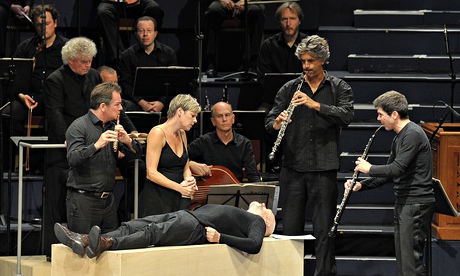
It was the wooden blocks that got me worried. The orchestra had come on stage, looking like orchestras do. The conductor had joined them, in one of those Nehru jackets you only see at places like Wigmore Hall. And scattered around the stage, where you might expect a choir to be, were what looked like balsa-wood blocks.
Moments later they trooped on: men and women who had been told to wear black, and saw it as a chance to express their personality. Some had gone the whole hog, in slinky dresses or long, loose ones with chiffon wings. The man I thought was Jesus, but who I later found out was “the Evangelist”, was in skinny black trousers and brown shoes. It was only when we were walking into the Royal Albert Hall that the friend who had invited me to this performance of the St Matthew Passion told me it was “semi-staged”.
And only when I saw men and women in strange clothes cluster round the wooden blocks did I have some idea what he meant. It started off like a meeting of the Samaritans, with hands on shoulders and faces contorted with sorrow. Then, as a woman with red hair who seemed to be Mary Magdalene knelt before the man who may or may not have been Jesus, it began to look more like Fifty Shades of Grey. She was running her hands down his legs. She was floating her fingers over his crotch.
Everyone around me looked calmly ahead. Nobody seemed bothered that one of the most sublime pieces of religious music ever written was apparently on the verge of being interrupted by a blow job. It wasn’t. Thank goodness. I didn’t find out what happened after that, because I decided to keep my eyes shut. Then I could get on with doing what I always do when I go to concerts: think about the wine I’m going to have in the interval as the music bounces around my head.
I have no idea why someone thought it was a good idea to take this work of a genius and make it seem like a new age retreat. I have no idea why some members of the audience shout things in unison, and others laugh, as if this is funny. I have no idea how you can tell that the orchestra has played well. I don’t know much about classical music except that you can hear Bach, or Beethoven, or Handel, and think: this person knew what it was like to be alive.
I could have learned about music. I had piano lessons, but didn’t practise and gave up. I could have learned about contours and tonality and range, but I didn’t learn any of this, so when I listen to classical music, I feel as though I’m paddling on the edge of an ocean. I wish I didn’t, but I had my chance. Many children in this country don’t.
Most of the children at St Teresa’s primary school in Basildon, Essex, for example, have never seen a musical instrument. Or at least they hadn’t until they met the pianist James Rhodes. When he brought an orchestra into St Teresa’s – for a two-part documentary on Channel 4 called Don’t Stop the Music, the second part of which airs tonight – he might as well have flown them all to Mars.
“Mind-blowing!” said one young boy, who still seemed to be reeling from the shock. “I can’t explain,” said a girl who also seemed to be overcome, “because it’s, like, so exciting.”
When the children watched Rhodes play the piano, they literally jiggled and jumped. When they opened the boxes with the instruments he had found for them, their eyes shone. And when they performed a simple piece, in front of their parents, everyone clapped as if they’d won a Nobel prize. “When you give a kid an instrument,” said Rhodes, “miraculous things can happen.” On the evidence of this programme, they can. But these children are the lucky ones.
Most children from their background aren’t. If there’s a “music boom” in schools, as the Associated Board of the Royal Schools of Music suggested in a report, it’s a “boom” for the better off. Almost three quarters of children from affluent backgrounds said they had lessons, compared with 53% of those from poorer backgrounds. Children from “higher social groups” are twice as likely to do music exams, or play string, brass, piano and woodwind instruments. Thirty per cent of the children who had never had lessons said they couldn’t, because they were too expensive. “Miraculous things” can happen, in other words, but if your parents aren’t well off, they probably won’t.
Who knows if the children at St Teresa’s will keep going? Some of them, like me, will probably give up. Some of them, with any luck, won’t. If they don’t give up, they’ll learn one of life’s biggest lessons: that it’s difficult to make something beautiful, but that difficult things bring joy. And that to add to the sum of joy in the world might be as good as it gets. It would be nice to think that some of those children will make it to the stage of the Albert Hall. If they do, let’s hope they pluck up the courage to tell whoever’s in charge to let the music speak, and ditch the mime.

